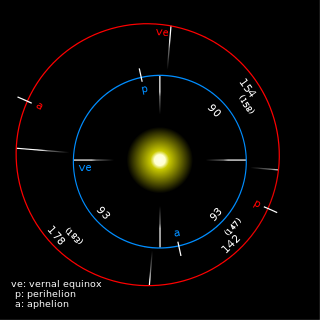This page is based on this
Wikipedia article Text is available under the
CC BY-SA 4.0 license; additional terms may apply.
Images, videos and audio are available under their respective licenses.
A leap year is a calendar year containing one additional day added to keep the calendar year synchronized with the astronomical or seasonal year. Because seasons and astronomical events do not repeat in a whole number of days, calendars that have the same number of days in each year drift over time with respect to the event that the year is supposed to track. By inserting an additional day or month into the year, the drift can be corrected. A year that is not a leap year is called a common year.

New Year is the time or day at which a new calendar year begins and the calendar's year count increments by one.
Year 1326 (MCCCXXVI) was a common year starting on Wednesday of the Julian calendar.
Year 1410 (MCDX) was a common year starting on Wednesday of the Julian calendar.
Year 1387 (MCCCLXXXVII) was a common year starting on Tuesday of the Julian calendar.
Year 1404 (MCDIV) was a leap year starting on Tuesday of the Julian calendar.
Year 1412 (MCDXII) was a leap year starting on Friday on the Julian calendar.
Year 1432 (MCDXXXII) was a leap year starting on Tuesday of the Julian calendar.
Year 1311 (MCCCXI) was a common year starting on Friday of the Julian calendar.
Year 1339 (MCCCXXXIX) was a common year starting on Friday of the Julian calendar.

The Ides of March is a day on the Roman calendar that corresponds to 15 March. It was marked by several religious observances and was notable for the Romans as a deadline for settling debts. In 44 BC, it became notorious as the date of the assassination of Julius Caesar which made the Ides of March a turning point in Roman history.

Various schemes have been used or proposed for timekeeping on the planet Mars independently of Earth time and calendars.

The Nanakshahi calendar is a tropical solar calendar which is used in Sikhism and is based on the 'Barah Maha'. Barah Maha was composed by the Sikh Gurus and translates as the "Twelve Months". It is a poem reflecting the changes in nature which are conveyed in the twelve-month cycle of the Year. The year begins with the month of Chet, with 1 Chet corresponding to 14 March. The first year of the Nanakshahi Calendar starts in 1469 CE: the year of the birth of Guru Nanak Dev.

A fiscal year is the period used by governments for accounting and budget purposes, which varies between countries. It is also used for financial reporting by business and other organizations. Laws in many jurisdictions require company financial reports to be prepared and published on an annual basis, but generally do not require the reporting period to align with the calendar year. Taxation laws generally require accounting records to be maintained and taxes calculated on an annual basis, which usually corresponds to the fiscal year used for government purposes. The calculation of tax on an annual basis is especially relevant for direct taxation, such as income tax. Many annual government fees—such as Council rates, licence fees, etc.—are also levied on a fiscal year basis, while others are charged on an anniversary basis.

Enbun (延文), also transcribed Embun, was a Japanese era name of the Northern Court during the Era of Northern and Southern Courts after Bunna and before Kōan. This period spanned the years from March 1356 through March 1361; The emperor in Kyoto was Emperor Go-Kōgon . Go-Kōgon's Southern Court rival in Yoshino during this time-frame was Emperor Go-Murakami

Bunna (文和), also romanized as Bunwa, was a Japanese era name of the Northern Court during the Era of Northern and Southern Courts after Kannō and before Enbun. This period spanned the years from September 1352 through March 1356. The emperor in Kyoto was Emperor Go-Kōgon (後光厳天皇). Go-Kōgon's Southern Court rival in Yoshino during this time-frame was Emperor Go-Murakami (後村上天皇).
The Iranian Chess Championship is the yearly national chess championship of Iran. Below is the gallery of champions, notice the gap between 1980 and 1990, when chess was forbidden in Iran. There is also a gap between 1977 and 1980 because of the Iran Revolution.
The Gregorian calendar is the most widely used civil calendar in the world. It is named after Pope Gregory XIII, who introduced it in October 1582. The calendar spaces leap years to make the average year 365.2425 days long, approximating the 365.2422-day tropical year that is determined by the Earth's revolution around the Sun. The rule for leap years is:
Every year that is exactly divisible by four is a leap year, except for years that are exactly divisible by 100, but these centurial years are leap years if they are exactly divisible by 400. For example, the years 1700, 1800, and 1900 are not leap years, but the year 2000 is.






